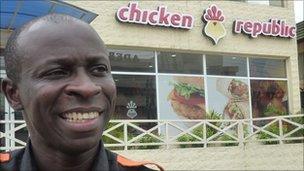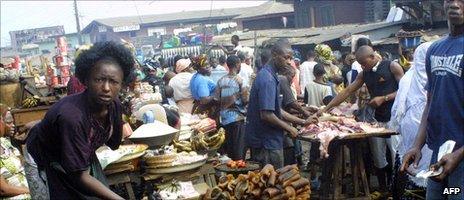Nigeria's thriving economy lures expats back home
- Published

Tunde Ogunrinde returned to Nigeria two years ago and now runs a fast-food chain
At first glance Tunde Ogunrinde appears completely at home in Nigeria's commercial capital Lagos.
Armed with a winning smile, the 42 year old chats easily with the staff working behind the till at fast-food restaurant Chicken Republic.
But this is all relatively new for the chain's chief operating officer.
For two decades the father of three lived in the UK working in a management position for a hamburger chain.
Then two years ago he took the difficult decision to move his family back to the country of his birth.
"It's a growing economy and time to get back in," he says in an accent that carries more than a few hints of his time living in the British city of Birmingham.
"Growth here was going in the right direction, whereas in Europe it was flattening out. It's time to capitalise."
So Mr Ogunrinde became what is known locally as a "repat" with responsibility for 65 Chicken Republic restaurants.
Brain gain
No-one keeps reliable statistics but he is one of thousands, possibly hundreds of thousands, of educated Nigerians who have decided to return because of a combination of strong growth back home, and the economic slowdown in the West.
"At the height of the recession in Europe and the US it was crazy because everyone was getting in touch saying they wanted to go home," says Ade Odutola from the job recruitment website Wazobiajobs.com.
"It's calmed down a bit now but lots of Nigerians who left in the 1980s and early 90s are now seeing other people being successful back home and that's a real magnet pulling them back."
With business booming, Mr Odutola says Nigerian companies are now in a position to pay salaries that are attractive to people living around the world.
"What we're seeing is what's being called a brain gain," he says.
"The pool of talent that people can hire from here is now growing and that is good news for Nigeria."
But paying top salaries is only possible if Nigeria's economy continues to grow strongly. It is currently expanding at about 7.5%.
If recession elsewhere leads to a collapse in the demand for oil, Nigeria could still find itself sucked into the world's economic problems.
"Oil drives the economy here," says financial analyst Bismarck Rewane.
"Oil revenue drives investment, oil revenue drives government expenditure and consumer purchasing power. That's the bottom line."
Salary challenge
The "brain drain" of skilled professionals hit Nigeria's health service particularly hard with the medical journal, the Lancet, estimating that there are more Nigerian doctors working in the United States than in the public health care sector in Nigeria.
The man with the daunting task of providing care to Lagos's population of more than 15 million people is Jide Idriss, the state's health commissioner.
From behind a desk piled high with paper he tells me that there are currently just 20 doctors for every 100,000 Nigerians in Lagos State. In the UK the figure is around 200.
"The trend of brain drain is now getting lower and lower for doctors," he says.
"With the economy as it is overseas, countries aren't as open to Nigerian doctors as they used to be."
However, salaries in Nigeria remain modest.
The lowest paid doctors receive as little as 150,000 naira ($1,000; £630) a month.
The challenge is to make Nigeria an attractive destination for doctors and nurses to come back to work, the health commissioner says.
Not everyone who has returned looking for a job has found it easy.

Lagos is one of the biggest and busiest cities in Africa
Abiola Olanrewaju completed his secondary school and university in Kingston upon Thames in the UK before returning to Nigeria.
After a compulsory year of national service he says he is waiting for a good offer.
"I'm open to anything. The possibilities are endless here and hopefully in the long run I can hold my hand up and say I've made a success of coming back."
Those coming back to Nigeria find a country pregnant with possibilities, but also still struggling with basic infrastructure problems.
Electricity only works for a few hours every day and the streets in Lagos in particular are clogged with traffic.
Mr Olanrewaju says he enjoys his vibrant new surroundings but has found it necessary to make a few changes in order to survive.
"If you're not clued up all the time here people can leave you behind," he says.
"When I'm at the market I have to make sure I don't stand out from the locals so that means leaving my British accent behind."
Back at Chicken Republic the lunchtime crowd is starting to arrive. As he watches the poultry depart and the money come in Mr Ogunrinde is also reflecting on the difference between business in Europe and Nigeria.
"Nigeria has been cast in a negative light but if you come back and look on the ground you'll see a serious entrepreneurial mindset which I think is lost in Europe," he says.
"I think this is the beginning of great things for the country."
- Published10 October 2011
- Published30 August 2011
- Published10 May 2011
- Published20 August 2010